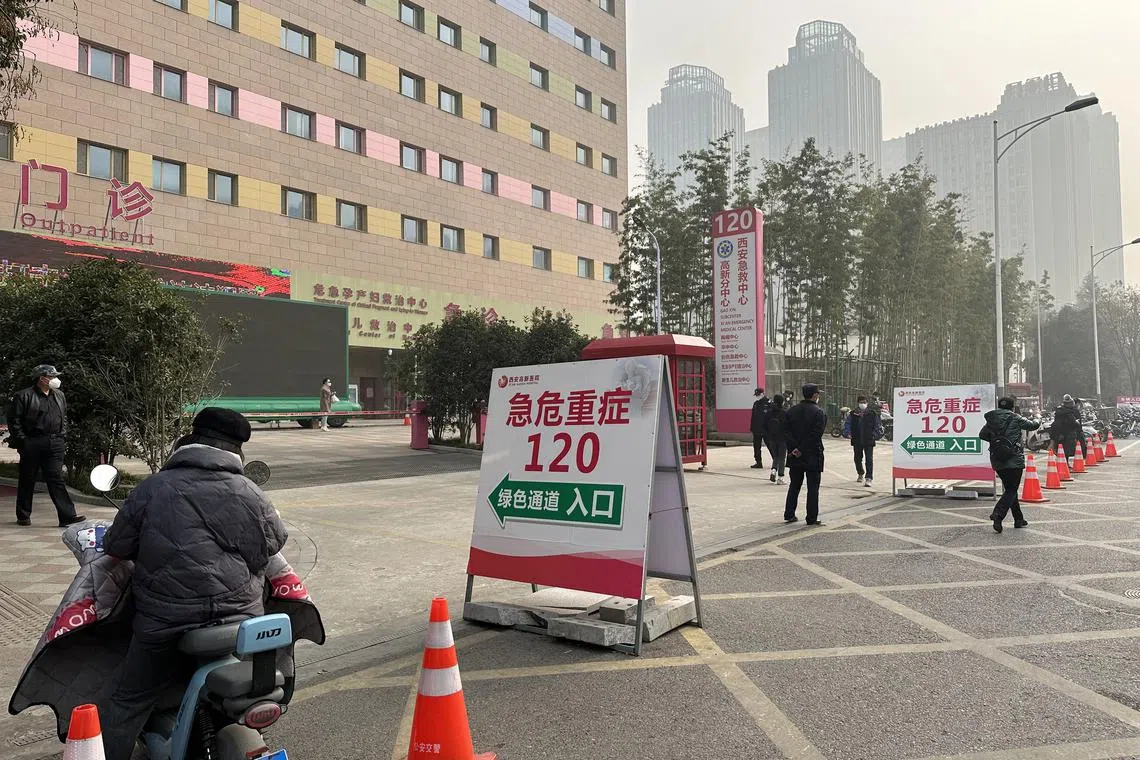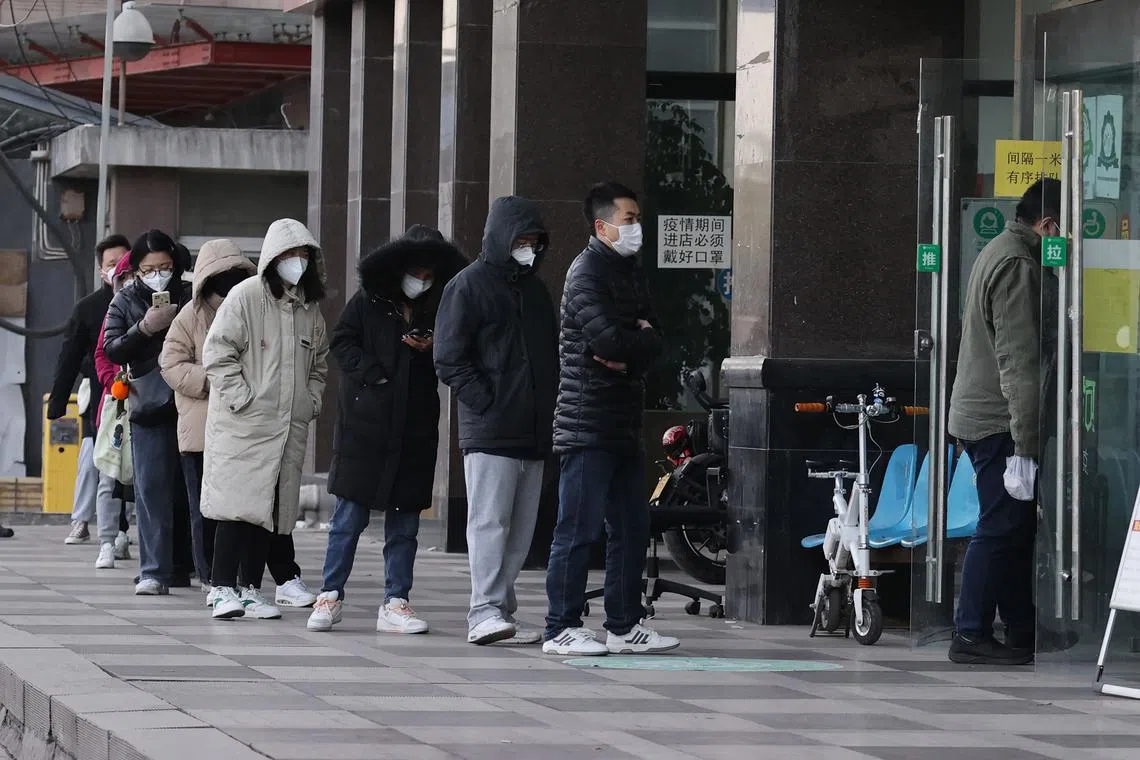China’s ancient capital tiptoes out of Covid-19’s shadow
Sign up now: Get insights on Asia's fast-moving developments

The western city of Xi’an is still edging its way back to normalcy, even as Covid-19 restrictions have been lifted.
ST PHOTO: ELIZABETH LAW
XI’AN - Just within Xi’an’s historic city walls is the Bell Tower district, an area dotted with eateries usually popular with tourists. On a wintry Thursday night, snaking queues formed outside hotpot restaurants and skewer shops, where customers sat on little plastic stools as they waited.
Many were locals taking advantage of the lack of tourists to patronise popular restaurants.
Usually a popular destination for those wanting to see China’s ancient capital, or a stopping point before visiting the terracotta warriors, the western Chinese city is still edging its way back to normalcy, even as Covid-19 restrictions have been lifted.
Mask-wearing, especially of the N95 variety, is still common; many people don them even outdoors and in restaurants when not eating. Shops have hand sanitiser readily available for customers, and staff remind patrons not properly wearing their masks to adjust them.
“Since last winter, we have had many experiences with Covid-19, so we all would rather be careful,” said convenience store employee Chen Ni, referring to the harsh citywide lockdown between December 2021 and January 2022 that left many without access to essential supplies.
The 26-year-old, who recovered from a bout of Covid-19 in mid-December, said she still takes extra precautions such as masking up and frequently sanitising. “Even though I have some sort of immunity now, what if there is a new version of the virus?” she said.
Down the road in Yanta District, there was barely a queue for tickets to enter the Giant Wild Goose Pagoda, a once-popular tourist attraction.
Driver Liu Yanhong, who used to ferry mostly foreign tourists on private tours, said traffic around the area has also eased significantly in the past six months.
“Only since the new year have traffic jams started coming back, but you don’t see as many tour buses as before,” he told The Straits Times.
In pursuit of a zero-Covid policy, various provinces and regions started increasing travel restrictions following a spike in cases after the summer holidays.
With some of these new rules being sudden and arbitrary, it also meant travellers could unwittingly get caught up in lockdowns or, worse, be prevented from returning to their home cities, denting any appetite for holidays.
As the flow of foreign tourists dried up, the 45-year-old started working as a part-time driver on a ride-hailing platform, but even that source of income has taken a hit.
“I used to be able to do that about 14 nights a month to supplement my income, but by end-November it stopped, because people were getting sick and not going out,” he said. “Some people offered me a lot to ferry their relatives to the hospital, but I didn’t dare to because I still haven’t been infected.”
From his three-storey hostel-turned-bar within spitting distance of the ancient walls, Mr Xing Bin has seen tourists come and go in the past 12 years.
Hardest to bear, he said, has been 2022 as various virus regulations kept at home travellers worried of getting caught up in flash lockdowns.
“For a time, this was a place that attracted free-spirited wanderers and artists who wanted a break from the mainstream,” the 37-year-old said.
But as China’s zero-Covid policy took hold and economic disruptions widened, consumer sentiment started to wane, with many reluctant to spend on non-essentials such as holidays.
The winter of December 2021 till early 2022 was a very hard time, Mr Xing said, referring to the period when the city was locked down after a spike in cases but was woefully unprepared logistically.
Many had little food or medicine, while the sick were turned away from hospitals because they lacked the requisite Covid-19 test. At least two women miscarried as a result, and several health officials were censured in the wake of the debacle. But it looks like the city has put the worst of the virus behind it.
When ST visited several hospitals across the city last week – including Xi’an Gaoxin Hospital, which drew flak after a woman miscarried outside it
Emergency departments also appeared calm, with a steady flow of patients but none of the chaos that emerged when Covid-19 ripped across the country in December.
Pharmacies had also been restocked, though customers are limited to buying only two boxes each of cold and fever medication.

People queueing to buy antigen test kits at a pharmacy in Xi’an, China, on Dec 20, 2022.
PHOTO: AFP
With multiple provinces announcing that the worst of the Covid-19 wave is over,
A senior government official said at the weekend that China expects to receive up to 75 per cent of its pre-pandemic tourist numbers in 2023. Many of them are likely to be visiting relatives, as well as for leisure, said Mr Dai Bin, president of the China Tourism Academy and director of the Data Centre of the Ministry of Culture and Tourism.
Since Sunday’s lifting of travel restrictions,
Domestically, travel operators are expecting a surge of travellers during the upcoming Chinese New Year holidays. Restrictions over the past three years meant many had been unable to return to their home towns to celebrate the festival with their families, while some were put off by the prohibitive cost.
The 40-day travel rush around Chinese New Year,



